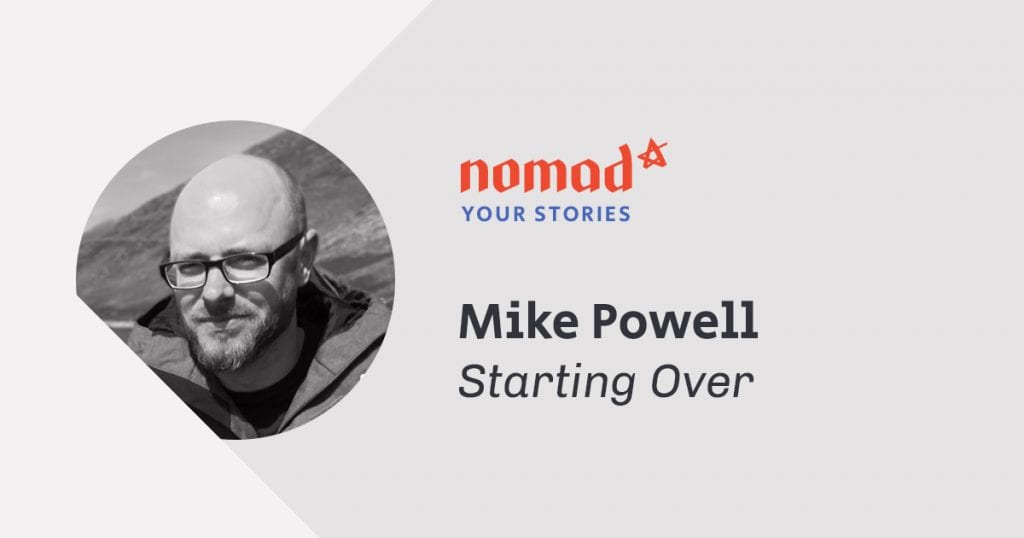The archetypal narrative of a Christian often begins with that remembered moment when they first welcomed Jesus into their life as a young person. However, what has instead become the most defining aspect of my life’s journey to date took place in September 2007 – when I was 27 years old and I discovered that my faith was precipitously waning. It was almost like having lost or misplaced something valuable that I once had; something that was deeply important to me, that defined who I was, and that I desperately wanted to find. And though I never fully stopped believing in the existence of God or in the teachings of and about Jesus, my progressively conscious awareness of a disconnect between theoretical doctrine and practical experience manifested itself in what I would describe as a decade-long existential crisis. If I had been doing anything other than full-time vocational ministry in the church at that point in time, I don’t know if I would have felt so conflicted and hypocritical. But the flip-side of being in such a predicament is that it forced me to wrestle through the dis-integration in order to salvage something workable with the negligible faith that remained.

Given that my inherited spiritual framework was profoundly Trinitarian, at the core of my unease was (and continues to be) not seeing God as actively involved in the world and our lives. It made me wonder if the divine silence I knew was my fault, or on the other hand, whether God for whatever reason had ceased to speak. After all, if God is presented to us in the Bible as a personal being – who communicated with language to people throughout the history of Israel, who became incarnate in the person of Jesus Christ, and who is said to relate to us still via the Holy Spirit – then one would understandably assume that a “relationship” with God is not only possible, but arguably normative for us as humans. But when prayer was consistently experienced as a non-conversational monologue, when requests for others to not suffer and die constantly went unanswered, when it became evident that other people’s “hearing from God” recurrently seemed to accord only with what they themselves wanted to hear, etc…the cumulative effect of such disenchantments facilitated the razing of my formerly held beliefs to the ground. And unfortunately, there is little room in most churches for open and honest dialogue about questions, uncertainties or even the consideration of alternative perspectives – especially for those in positions of leadership.
So, I largely kept this desolation to myself and assumed that my sense of feeling lost would eventually pass. But since I was still employed by the church, I was duty-bound to figure out some authentic path forward that both acknowledged my doubts and was nonetheless true to those inarguably core Christian principles of mercy, grace and love. It was around this time that I became familiar with the work of people like Brian McLaren, Rob Bell and Peter Rollins, whose writing gave me hope that there might be different yet valid ways of understanding the Judeo-Christian story. Coincidentally, I was then extremely fortunate to reconnect with an old friend from high school, who I spent many hours with over the next number of years – pints of beer in hand – talking through our mutual wonderings about the mysteries of life and faith. And since writing music has always been the most cathartic and genuine way for me to work through difficulties, many songs were inspired by and recorded during those dark days. All of these things helped me to not cross the line into outright apostasy. Yet, it was also quickly becoming clear to me that the necessary evolution of my convictions wouldn’t be well received. In other words, while critics of those who hold beliefs that aren’t entirely “orthodox” may fault so-called “heretics” for not taking the Bible or God seriously enough, though my faith was in flux, I was anything but apathetic – the source of my trouble was that I took my spiritual life very seriously.
As I wrote in one song a few years ago: “I guess nothing is what you need to truly start again.” In many ways, that seems to be where I find myself now – starting over. Or as I’ve more recently heard it described, perhaps this past season of barrenness since 2007 was the vanguard for what is termed a “second naiveté.” Because though I continue to find myself in a space of feeling in-between, unsettled and spiritually adrift, even so the overarching story of the Hebrew Bible and the remembered teachings/example of Jesus make sense to me. Day-to-day, I don’t unwaveringly believe – but I want to. More often than not, my faith in Christ today may sound to others and be experienced by me as much closer to existentialism or deism. However, if I’m honest, I find myself to be in a better place as a Christian than I’ve ever been. I’m less sure about more things and have fewer strictly held beliefs. Yet, this requires me to deliberately choose to have faith in God, which highlights the important notion that trust is not a feeling – it’s a choice. It’s not always possible to proverbially look on the bright side of life. I still do get discouraged and don’t quite know what to do with the practice of prayer. But what has been most encouraging for me in this age of interconnectedness – especially as mediated via podcasts and online communities like this one – is that we’re not alone. For that, I am particularly grateful and this motivates me on my better days to be willing with whatever strength remains to keep fighting the good fight of the faith.
– Mike Powell
